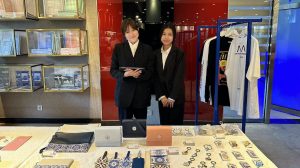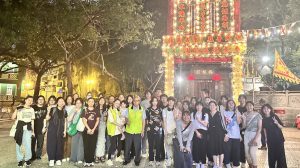IFT Visiting Professor Dr. John Ap was recently invited by integrated resort operator MGM China Holdings Ltd, to share with members of the firm’s training council and department heads his knowledge and insights regarding the theme park industry.
Prof. Ap’s extensive experience with that sector spans over more than 20 years. He is also the Director of IFT’s Global Centre for Tourism Education and Training.
During his presentation, which took place on 2 August, Prof. Ap highlighted some of the keys to success for theme parks. He also addressed the issue of differences between the theme park industry and the casino industry.
The IFT scholar dealt first with some of the basics. He noted that theme parks focused on rides and attractions, having an all-round entertainment focus. Casino resorts, however, were centred on gambling and shows, with the focus on betting. Theme parks were aimed at families and were open to all, while casinos had restricted access, for adults only.
Digging deeper into the topic, Prof. Ap noted differences in the food and drink operations at the 2 types of facility: theme parks were often rich in fast-food outlets, while casino resorts often had a good selection of fine dining outlets. While theme parks were often financially stretched, many casino resorts could rely on “deep financial pockets” boosted by revenue from gaming operations.
Last but not least, theme parks were often regarded by the public as “clean and good fun”, Prof. Ap said. Casino resorts, on the other hand, were typically subject to tight oversight, and were often considered in public discussion as a questionable source of fun, because of potential risks associated with gambling addiction, and perceived links to illegal activities such as loan sharking.
Prof. Ap noted that the foray into non-gaming activities by Macao’s casino industry had been fraught with challenges, and to date, the casino industry had not been too successful in its adoption of such attractions.
During his presentation, Prof. Ap noted that the local casino industry had been pushed into providing non-gaming attractions by government policy as well as market forces, in attempts to diversify casino offerings and expand the market. However, the lack of sustainability, especially in terms of financial feasibility, of such attractions was problematic and worrisome, he said.
This was exacerbated by cross-subsidisation – using revenue generated by gaming – of the financial losses incurred by non-gaming attractions, he added.
Prof. Ap also noted that the approach taken by casinos in Macao in providing non-gaming attractions came over as ad-hoc rather than holistic. There was also lack of tourism product ‘packaging’ to make such offerings attractive and appealing for guests, he added.
Mr. Francis Tan, MGM China’s Vice-president of Learning and Talent Management, expressed appreciation for Prof. Ap’s sharing session and his insights. “I am sure it has given the MGM team some things to think about,” he said.










